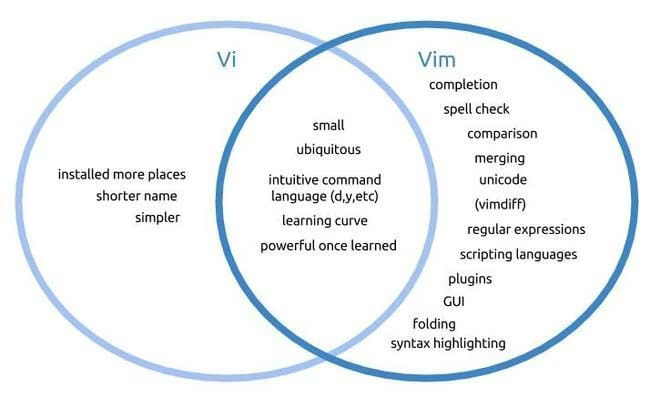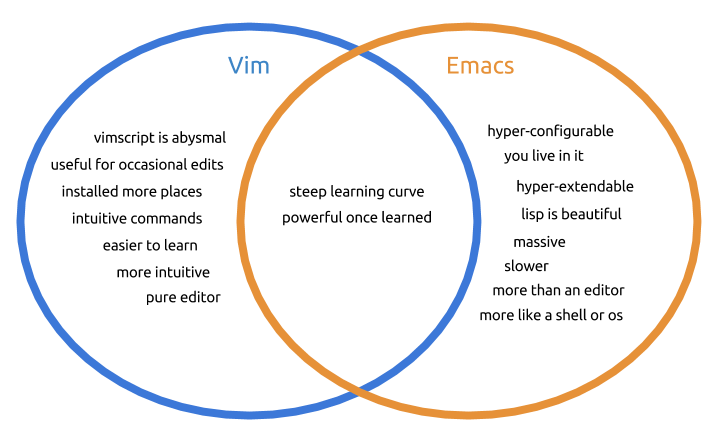The Differences Between Vi, Vim, and Emacs

vi vs vim
Few geek conflicts have the incandescence of the "best editor" debate. Say the words Vim or Emacs in a deeply crowd and you’ll likely hear the sound of Katana safety clasps.
But what’s the debate at this point? What are the merits of each? The advantages. The downsides.Let’s take a quick look at the core advantages and disadvantages of the top editors being used today.
Vi vs. Vim
The differences between Vi and Vim aren’t terribly significant. Vim is simply an improved version of Vi. It pretty much has a ton of stuff that Vi doesn’t, and the opposite isn’t really true.
Within Vim you can see the differences between Vi and Vim by running the following command:
:h vi-differences
The list is extensive, but the graphic above captures a good number of the major ones.
Vim vs. Emacs

Vim and Emacs are both extremely powerful text editors, and each has its own rabid following. I am a Vim person >, but I think I’m being mostly unbiased when I say that that Vim’s main strength is its intuitive command structure > that allows you to infinitely grow in capability by just learning the basics.
Emacs is less intuitive, but much more powerful if you put the effort in. Additionally, saying Lisp is better than Vimscript is like saying good things are better than bad things.
It really reduces to whether you want to spend most of your time in your "editor" in Emacs (more like an OS), or if you simply want an intuitive, powerful place to edit files.
I choose the latter, but I understand and respect why someone would be attracted to the former.
Vi(m) Basics
Creator: Bill Joy
Birth Year: 1976
Central Concept: Unix-like modularity. The idea is to have the commands work like a language >, where you can string together a few nouns and verbs to intuitively create thousands of combinations.
Advantages: Supremely intuitive once basics are learned. Installed nearly everywhere.
Disadvantages: Vimscript is hideous.
Emacs Basics
Creator: Richard Stallman
Birth Year: 1976
Central Concept: Ultimate power and configurability. The idea is to live in the system as much as possible, and to configure and extend it to your exact desires using Lisp..
Advantages: Unparalleled power and configuration using a great language (Lisp).
Disadvantages: Not everyone wants to join a church to use an editor.

Perspective
People who fetishize their editors often forget a key point: It’s the content that matters.
When you feel yourself getting too tangled in the editor debate, remember that Neil Gaiman and J.K. Rowling write much of their stuff with pen and paper, and most top writers use Microsoft Word. Then you have George R.R. Martin (creator of Game of Thrones) who writes all his reading using Wordstar 4.0, on DOS.
In short, editor battles can be fun, but remember that you’ll be judged on your output and not the tool you used to create it.